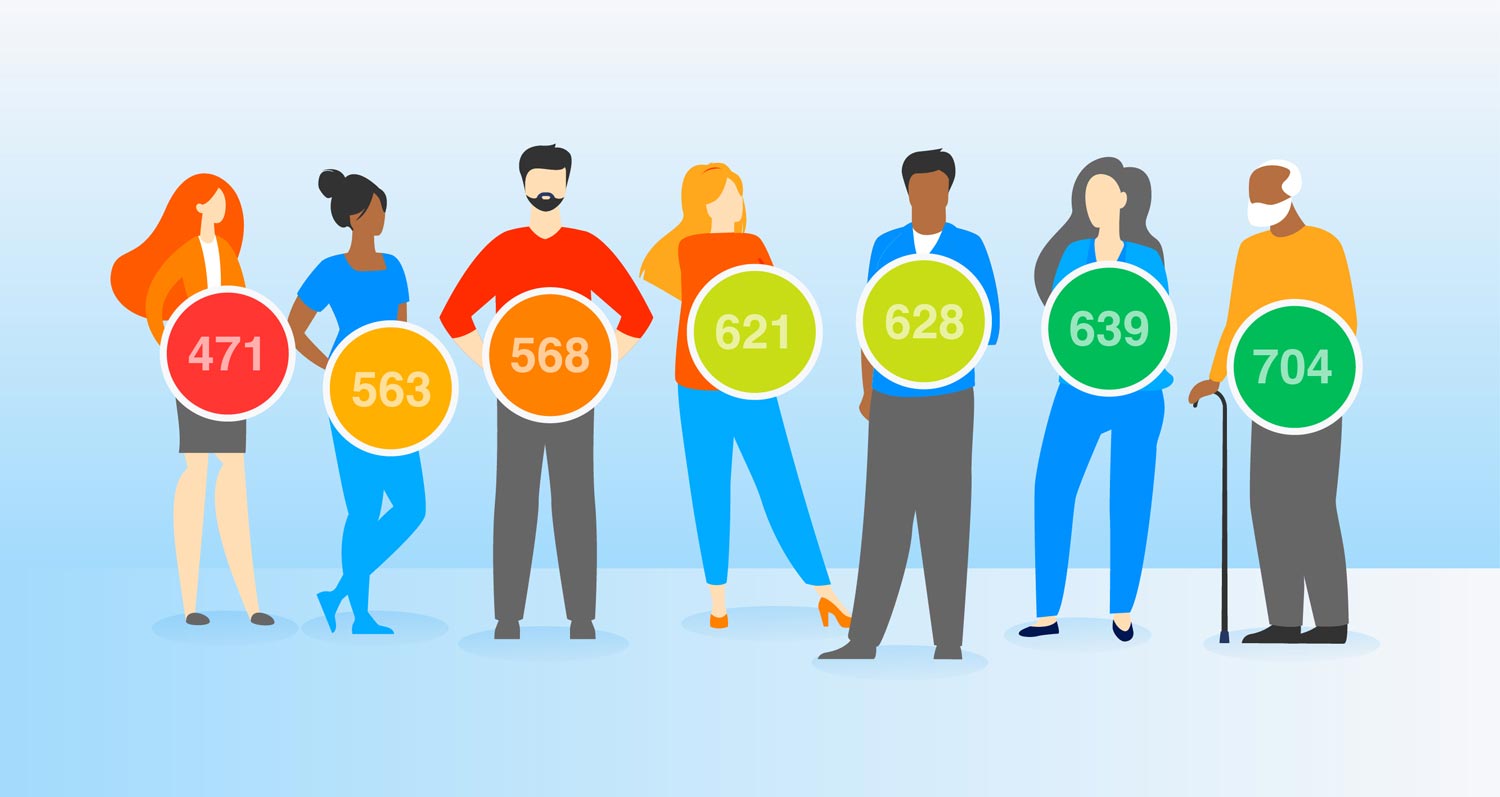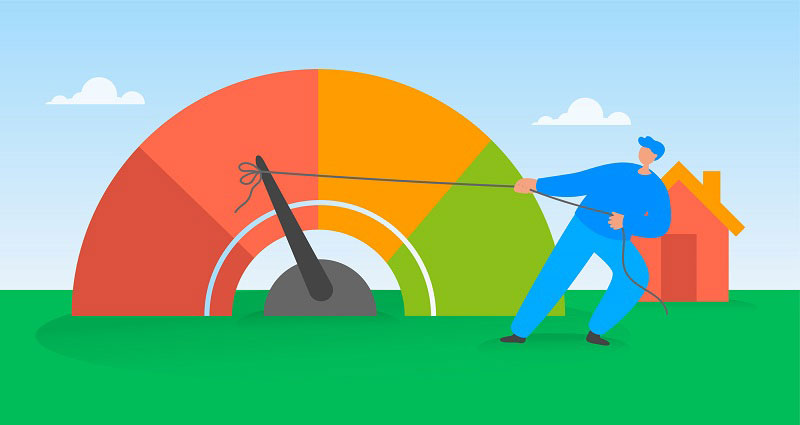
Your FICO Score is a three-digit number that is based on the information in your credit reports. This number is a score that helps lenders determine whether or not they should lend you money, approve you for a credit card, or give you a mortgage.
When you apply for any type of credit, your FICO credit score tells lenders how likely you will be to repay a loan on time, and therefore how much risk you pose to them as a borrower. Your score factors in items from your credit report; like how long you have been using credit, how much of your available credit is being used, and whether or not you make repayments on time.
FICO scores range between 300 and 850, with any score below 580 being classed as ‘poor’ and any score over 800 being classed as ‘exceptional’. In this article, we’ll discuss the average FICO credit score by age in the U.S., and look at why our credit score might change as we get older. [1] MyFICO, “What is a FICO Score?” https://www.myfico.com/credit-education/what-is-a-fico-score
Key statistics
- People in Generation Z (aged 18-26) have the lowest average credit score at 680, although this still falls into the ‘Good’ FICO score range.
- The average FICO score for Millennials (aged between 27 and 42) is 690; people in this age group use credit cards more frequently than any other generation.
- For Generation X (aged 45-58), the average credit score is 709, Gen Xers also have the highest average total debt at $61,036.
- Baby Boomers (59-77) have an average credit score of 745, and an average total debt of $52,401.
- The oldest age group, the Silent Generation (78 and over), has the highest average credit score at 760 which falls in the ‘Very Good’ FICO score range.
What age do you get a credit score?
Your first credit score is not based on your age but on when you start your first credit activity. It will typically take three to six months of activity on your first credit account before it can be used to calculate your FICO credit score. Credit accounts can include things like mortgages, credit cards, student loans, and personal loans. [2] Experian, “How Long Does It Take to Get Your First Credit Score?” https://www.experian.com/blogs/ask-experian/how-long-after-getting-first-credit-account-will-score-created/
If you have never used credit before, there are a number of ways you can build credit with no credit history. Some of these methods include:
- Getting a credit builder loan
- Applying for a secured credit card
- Becoming an authorized user of a credit card
- Using a third-party rent reporting service
- Asking someone to be a cosigner

How to Build Credit When You Have None
Building credit from scratch can be a lot easier when you understand where to start and which mistakes to avoid.
Download our guideAverage FICO credit score per age group
In and of itself, age doesn’t matter to your score because FICO doesn’t consider your age in its scoring model.
FICO also doesn’t consider your race, religion, origin, sex or marital status as U.S. law prohibits credit scoring from using this information. Other things that aren’t factored into your FICO score are your address, whether you receive public assistance, or any information not found in your credit report. [3] MyFICO, “What’s Not in Your FICO Score?” https://www.myfico.com/credit-education/credit-scores/whats-not-in-your-credit-score
Your FICO score is based on information from the three major credit reporting bureaus (Equifax, Experian and TransUnion), which track your history of handling (or mishandling) debt.
Data from the third quarter of 2023 shows that the average credit score by age breaks down as follows:
| Age | Average FICO Score (2023) |
|---|---|
| Generation Z (18-26) | 680 |
| Millennials (27-42) | 690 |
| Generation X (43-58) | 709 |
| Baby boomers (59-77) | 745 |
| Silent Generation (78+) | 760 |
Source [4] Experian, “What is the Average Credit Score in the U.S?” https://www.experian.com/blogs/ask-experian/what-is-the-average-credit-score-in-the-u-s/
Average credit score for Gen Zers (18-26)
The average FICO score for Gen Zers aged between 18-26 is 680. [4] Experian, “What is the Average Credit Score in the U.S?” https://www.experian.com/blogs/ask-experian/what-is-the-average-credit-score-in-the-u-s/
If you’re a Gen Zer in your late teens or early 20s, you will most likely be starting out with a “thin file” at the credit reporting bureaus. That’s because you haven’t used credit much yet, except perhaps for student loans.
However, your 20s offer plenty of chances to start building a credit history. It’s a good idea to get started as early as possible, since the length of your credit history makes up 15% of your FICO score. [5] MyFICO, “How are FICO Scores Calculated?” https://www.myfico.com/credit-education/whats-in-your-credit-score
If you can’t get a credit card right away, one option would be to ask to be added as an authorized user to a parent’s card, or apply for a secured credit card (making sure that the one you choose is reported to all three credit bureaus).
A study from TransUnion shows that, as of Q4 2023, 84% of credit-active Gen Zers aged between 22 and 24 have at least one credit card (bankcard). [6] TransUnion, “Gen Z Consumers are Using Credit More and Differently” https://newsroom.transunion.com/gen-z-using-credit-differently/
Credit scores for Millennials (27-42)
The average FICO score for Millennials aged between 27 and 42 is 690. [4] Experian, “What is the Average Credit Score in the U.S?” https://www.experian.com/blogs/ask-experian/what-is-the-average-credit-score-in-the-u-s/
Like Gen Zers, Millennials’ average credit score falls into the ‘Good’ FICO range at 690, 10 points above the average Gen Z score.
A study by Forbes found that Millennials use credit cards more frequently than other generations, with 36% saying they use a credit card at least once per day. [7] Forbes, “Credit Card Usage Trends by Generation” https://www.forbes.com/advisor/credit-cards/credit-cards-trends-by-generation/
Millennials have an average of 3.5 credit cards each which, if used responsibly and paid off on time, could contribute to the Good average credit score seen in this age group. [8] Experian, “What is the Average Number of Credit Cards?” https://www.experian.com/blogs/ask-experian/average-number-of-credit-cards-a-person-has/
Credit scores for Generation X (43-58)
The average FICO score for Generation Xers between 43 to 58 years old is 709. [4] Experian, “What is the Average Credit Score in the U.S?” https://www.experian.com/blogs/ask-experian/what-is-the-average-credit-score-in-the-u-s/
Average credit scores continue to increase as people age. After all, you might have been using credit cards for a while and may also have established a couple of decades’ worth of regular payments on a car loan and/or a mortgage.
However, this can be a costly period of your life. If you have kids, their needs are growing. You might also be contributing to their college savings plans, or even helping pay their tuition right now. Unanticipated college costs – fees, books, dorm supplies, travel to and from the school – can wind up on a credit card.
Personal debt reaches peak level for Gen Xers, with data on Credit Karma members showing an average of $61,036 in total debt for people in this age range, the highest average across all generations. This includes debt from credit cards, auto loans, mortgages, and student loans. [9] Credit Karma, “Average American Debt by Age” https://www.creditkarma.com/insights/i/average-debt-by-age
Since the “credit utilization ratio” makes up 30% of your FICO score, try to limit your card use to no more than 30% of available credit at any given time. The lower the percentage, the better. [5] MyFICO, “How are FICO Scores Calculated?” https://www.myfico.com/credit-education/whats-in-your-credit-score
Credit scores for Baby Boomers (59-77)
The average FICO score for Baby Boomers between 59 and 77 years old is 745. [4] Experian, “What is the Average Credit Score in the U.S?” https://www.experian.com/blogs/ask-experian/what-is-the-average-credit-score-in-the-u-s/
When looking at the average credit score for Baby Boomers, it’s higher still at 745, and people in this age group see the biggest jump in credit score compared to other generations.
However, expenses can still be high if your kids haven’t finished college – or if they’ve come back to live with you. Research shows that around 57% of young adults aged 18 to 25 are living in a parent’s home, an increase compared to 53% in 1993. [10] Pew Research, “Parents, Young Adult Children and the Transition to Adulthood” https://www.pewresearch.org/social-trends/2024/01/25/parents-young-adult-children-and-the-transition-to-adulthood/
Data based on Credit Karma members shows that Baby Boomers have an average total debt of $52,401, the second-highest behind Generation X. [9] Credit Karma, “Average American Debt by Age” https://www.creditkarma.com/insights/i/average-debt-by-age
Credit scores for the Silent Generation (78 and over)
The average FICO score for the Silent Generation aged 78 and over is 760. [4] Experian, “What is the Average Credit Score in the U.S?” https://www.experian.com/blogs/ask-experian/what-is-the-average-credit-score-in-the-u-s/
Those in the Silent Generation have the highest average credit score across all age groups at 760, falling into the ‘Very Good’ FICO range.
People in this age group also have the second lowest average total debt at $41,077, second only to Gen Z, many of whom will be very early in their credit journey. Data also shows that those in the Silent Generation have the lowest average mortgage debt of any generation, at $163,702. [9] Credit Karma, “Average American Debt by Age” https://www.creditkarma.com/insights/i/average-debt-by-age
According to data from the U.S. Census Bureau, nearly 63% of owner-occupied housing units owned by people over 65 are mortgage-free, which may contribute to the lower average debt of those in the Silent Generation. [11] Construction Coverage, “Cities with the Most Working-Age Residents Who Have Paid Off Homes” https://constructioncoverage.com/research/where-residents-have-paid-off-homes
The bottom line
Keep in mind that an “average” credit score is just an approximation based on many different factors, and everyone’s financial situation is different. Being a Millennial doesn’t guarantee you’ll have a lower credit score than a Baby Boomer.
Your age also doesn’t limit you to a particular number; just because you’re in your 20s doesn’t mean you can’t have a “Good” or “Very Good” credit score if you use credit wisely and make on-time payments.
Your credit score can make a huge difference in your life. Develop smart money habits and use strategies like on-time payments, low credit utilization, and length of credit history to build your FICO score, and this could improve your chances for a secure financial future.
Sources
- [1] MyFICO, “What is a FICO Score?” https://www.myfico.com/credit-education/what-is-a-fico-score
- [2] Experian, “How Long Does It Take to Get Your First Credit Score?” https://www.experian.com/blogs/ask-experian/how-long-after-getting-first-credit-account-will-score-created/
- [3] MyFICO, “What’s Not in Your FICO Score?” https://www.myfico.com/credit-education/credit-scores/whats-not-in-your-credit-score
- [4] Experian, “What is the Average Credit Score in the U.S?” https://www.experian.com/blogs/ask-experian/what-is-the-average-credit-score-in-the-u-s/
- [5] MyFICO, “How are FICO Scores Calculated?” https://www.myfico.com/credit-education/whats-in-your-credit-score
- [6] TransUnion, “Gen Z Consumers are Using Credit More and Differently” https://newsroom.transunion.com/gen-z-using-credit-differently/
- [7] Forbes, “Credit Card Usage Trends by Generation” https://www.forbes.com/advisor/credit-cards/credit-cards-trends-by-generation/
- [8] Experian, “What is the Average Number of Credit Cards?” https://www.experian.com/blogs/ask-experian/average-number-of-credit-cards-a-person-has/
- [9] Credit Karma, “Average American Debt by Age” https://www.creditkarma.com/insights/i/average-debt-by-age
- [10] Pew Research, “Parents, Young Adult Children and the Transition to Adulthood” https://www.pewresearch.org/social-trends/2024/01/25/parents-young-adult-children-and-the-transition-to-adulthood/
- [11] Construction Coverage, “Cities with the Most Working-Age Residents Who Have Paid Off Homes” https://constructioncoverage.com/research/where-residents-have-paid-off-homes






